Leonard Cohen: songwriter and poet.
Cohen has a song that is perhaps one of the most haunting songs ever recorded, appealing to a multi-generational audience. It’s always a new experience to hear those first few notes with the words, “Now I’ve heard there was a secret chord…”
The song is Hallelujah, first recorded in 1984. Cohen, who occupies his own place in the rock pantheon somewhere in the vicinity of Bob Dylan, is best known for this song, and the best-known version of it is the one recorded by the late Jeff Buckley in 2009, which has had more than 74 million views on YouTube. If that weren’t enough, there’s even an entire book on the song, The Holy or the Broken: Leonard Cohen, Jeff Buckley & the Unlikely Ascent of “Hallelujah, ” published by Alan Light in 2012.
While Buckley’s version may be the best known, singer Rufus Wainright’s version in the soundtrack for the movie Shrek (2001) introduced the song to tens of millions of people. And earlier this summer, Wainright recorded a version of the song with 1, 500 people in an abandoned power station—and it’s one moving video (see below).
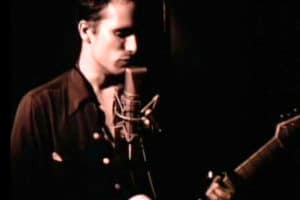
Jeff Buckley performing “Hallelujah”
What I didn’t know until recently was that Cohen had written several additional verses for the song. I found them in a small book published by Everyman’s Library entitled Leonard Cohen: Songs and Poems.
The title is somewhat provocative; one doesn’t mix song lyrics and poems, right? Serious poets sniff at the idea. Cohen, however, obviously doesn’t care, because that’s exactly what he’s done in this small volume.
The work is full of surprises. There’s no differentiation between poems and songs; they’re all arranged just like a conventional book of poetry. In fact, I thought that I was reading a conventional book of poetry until I came to Suzanne, and I realized it was not a poem but the lyrics to the song written by Cohen, made popular in the 1960s by Judy Collins.
And then came a cascade of song lyrics, printed as poetry, and I was struck by how much of Cohen’s lyrics could easily be read as poetry. Both his songs and his poems contain common themes and ideas—love, relationships, sex (sometimes graphic sex), the transience of life, religion, brokenness. His songs include the repetition of choruses but poems often use substantial amounts of repetition as well.
Here is one poem that is clearly recognizable as a poem:
This is my voice
but I am only whispering
The amazing vulgarity
of your style
invites men to think
of torturing you to death
but I am only whispering
The ocean is whispering
The junk-yard is whispering
We no longer wish to learn
what you know how to do
There is no envy left
If you understood this
you would begin to shiver
but I am only whispering
to my tomahawk
so that the image itself
may reduce you to scorn
and weaken you further
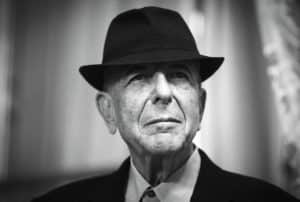
Leonard Cohen
Some say the difference between a song and a poem is obvious—songs use music in addition to lyrics and are arranged for performance. But speaking poems aloud shifts them in the direction of performance, too. I’ve also heard some say that the difference between a song and a poem is that a song is aimed at a popular audience and a poem at a literary one. The implied snobbery of that idea aside, I’m not sure it truly makes a significant difference.
Songs and poems both appeal to mind and emotion. I can remember the lyrics of the songs of my teen years as easily as I can recall what poems I memorized. Both tell stories, both can reach to create a common understanding, and both can capture an era. The contents of Cohen’s Selected Poems demonstrates this.
Leonard Cohen’s “Hallelujah” does all of these things. His “cold and broken hallelujah” could easily characterize the times we live in. Whether I call it a song or a poem doesn’t really seem to matter.
Related:
The Difference Between Poetry and Song Lyrics – poet Matthew Zapruder at the Boston Review.
Judy Collins on the song “Suzanne” and Leonard Cohen (video).
Photo by Micky, Creative Commons, via Flickr. Post by Glynn Young, author of the novels Dancing Priest and A Light Shining, and Poetry at Work.
__________________________
Megan Willome’s The Joy of Poetry—part memoir, part poetry reflections, part anthology—takes readers on a journey to discovering poetry’s purpose, which is, delightfully, nothing. “Why poetry?” Willome asks. “You might as well ask, why chocolate?” Poetry reflects nothing more and nothing less than the pure joy of living, loving, and being, in all of its confusion and wonder. Willome’s book will gently guide you to read, write, and be a little more human through language’s mystery and joy.
—Tania Runyan, author of How to Read a Poem: Based on the Billy Collins Poem “Introduction to Poetry”
- Poets and Poems: Sandra Marchetti and “Diorama” - April 24, 2025
- Poets and Poems: Christina Cook and “Roaming the Labyrinth” - April 22, 2025
- Longfellow’s “Paul Revere’s Ride”: Creating a National Legend - April 17, 2025
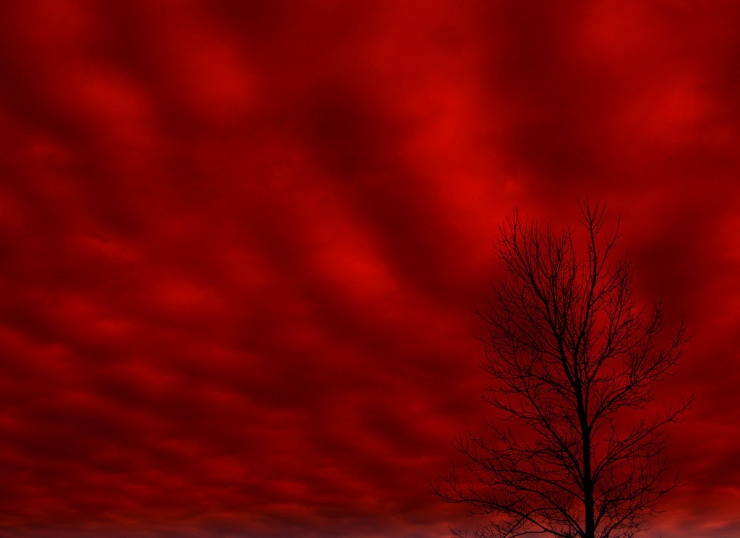
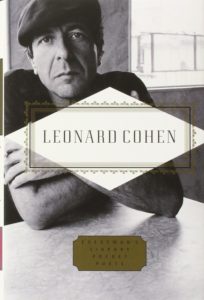
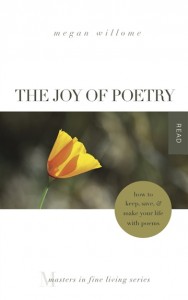
Donna Falcone says
Glynn! This is one of my favorite songs and the verses are just undending it seems… one is as important as the next and to sing them all would be herculean, so I always find it fascinating to see which verses an artist will choose to sing and exclude. KD Lang has an amazing version as well. This version gives me chills – the whole room full of people – singing. Oh. Okay I need a tissue. This is moving me to tears. I’m having that kind of a week.
I will definitely look for that collection of poems and songs. This, too, is a wonderful question and topic. But I’ll stop now before I get carried away. 😉
Glynn says
Donna, the song seems to resonate across generations. It’s been around for more than 30 years, and it still resonates. Thanks for the comment.
Maureen says
k.d. lang’s version of ‘Hallelujah’ is my favorite.
A good book about Cohen is Sylvie Simmons’s ‘I’m Your Man’. To say Cohen’s had an amazing life is an understatement.
Some may not know that he spent time at a Zen monastery and that one of the reasons he continues to hit the street is that his manager stole the money in Cohen’s retirement account, leaving him with little to nothing.
Early on Cohen had some success with his poetry. He’s written a lot of it.
Glynn says
What I find fascinating about “Broken Hallelujah” is how Cohen mixes the sacred and the profane to paint a picture. Thanks for the comment, Maureen!
Megan Willome says
Roseanne Cash says if what she’s written needs the backbeat, then it’s a song. A poem can stand on its own. I’d say “Hallelujah” is definitely a poem, married with a great melody.
Glynn says
Megan – I agree!
Paul Hughes says
I first heard the song at the end of the movie “Saint Ralph.” Played the credits over and over and over. Then got several other versions on iTunes, including Buckley’s of course, and a Cohen version.
I’d heard of other verses — some of them pretty explicit.
Need to get these books …
Glynn says
There are other versions, too, including a “Christian” version. Thanks for reading and commenting, Paul!
Sandra Heska King says
I was in tears with this… the music carries me away. Then I looked up the lyrics. Apparently I’ve never really heard all the lyrics. Put the lyrics (or the poem) together with the music, and you really have a story.
Glynn says
You do. And both poems and songs can tell stories.